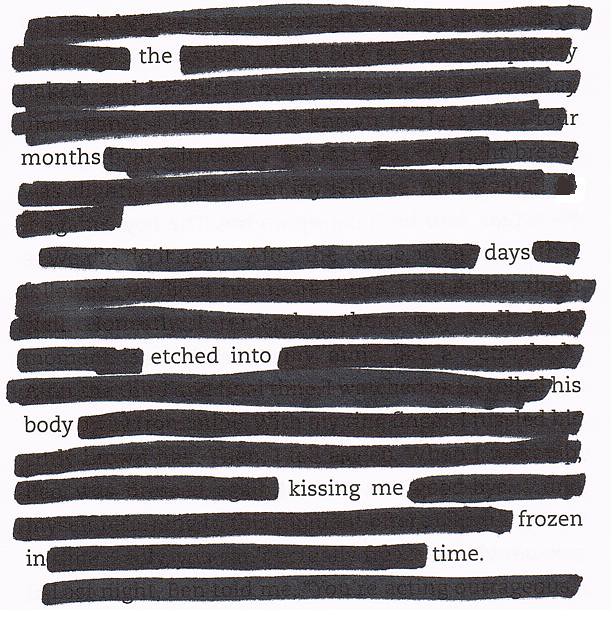I wasn’t sure what I would uncover when I typed used Creative Commons to search for results related to “poetry,” especially on platforms like feature primarily images or videos rather than written texts, and I was intrigued and in some cases surprised by the results.
The first place I looked was Flickr, where I found the expected photographs of stacks of poetry books, of people reading poetry, or of the word “poetry” featured in some way in graffiti or other art. However, I also found this image  by Flickr user //sugar, of an erasure poem. This caught my eye because erasure poetry is itself a form of remix, in which poets take an existing text and blackout words to make it say something new, and often prompts discussions about attribution, copyright, and the ethical implications of reusing someone else’s work in this way.
by Flickr user //sugar, of an erasure poem. This caught my eye because erasure poetry is itself a form of remix, in which poets take an existing text and blackout words to make it say something new, and often prompts discussions about attribution, copyright, and the ethical implications of reusing someone else’s work in this way.
Other Flickr uses had posted photography of their handwritten poems, which made me curious about how creative commons applies to this particular situation—are other users free to reuse and modify the actual poem in the image, or just the image of the poem itself?
Results from platforms focused primarily on audio and video sharing were often performances of spoken word poetry, sometimes edited to include sound effects or musical backing. Searching YouTube, I also found this video, a mini-lecture on Phillis Wheatley’s work. I thought this was particularly interesting because while there is plenty of educational content available for free on YouTube, most of it does not have a creative commons license, meaning it can’t be reused and remixed. This mini-lecture, on the other hand, could be transformed into other projects, and I wonder what kind of opportunities that might open up for educational video content.
Overall, I think Creative Commons is an effective way to address some of the issues surrounding remix; it provides a way for creators to clearly mark content that is available for reuse and to find content that they can freely repurpose without fearing legal repercussions. Partnering with existing media-sharing platforms and including a way to search these platforms makes this easy and convenient for creators, encouraging them to use work with a creative commons license rather than appropriating copyrighted work.
As with anything, though, it does present problems of its own. The content available may be limited or low-quality; it might create an environment where creators feel pressured to make their work available for free, something that is simply not sustainable for artists who are trying to make a living from their work. Additionally, I wonder how the format of creative commons interacts with a form of remix such as reappropriation—are there social and political critiques or statements that can only be made using copyrighted material, something that wasn’t intended to be taken out of its original context and reused?
It’d be nice if Creative Commons was a comprehensive solution to the problems of attribution and copyright surrounding remix culture, but I don’t think it is—I don’t think anything can be; these problems are complex, and no one thing is going to completely solve them.